HIT CHANNEL EXCLUSIVE INTERVIEW: April 2020. We had the great honour to talk with a legendary guitarist: Rick Derringer. In 1965, his band, The McCoys released “Hang On Sloopy”, which reached #1 on the Billboards charts. Later, he worked with Johnny Winter and Edgar Winter , before embarking on a successful solo career. He has also collaborated with Ringo Starr, Steely Dan, Alice Cooper, Kiss and others. Read below the very interesting things he told us:
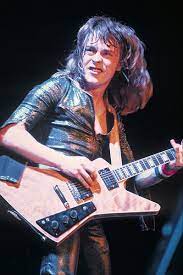 What are the projects you are currently involved with?
What are the projects you are currently involved with?
Right now, we are working on Rick Derringer Radio. We ’ll get it running in the United States and we are working on a brand new album. Just the work never stops. I love to play guitar right now.
Your music is now available on Patreon.com. Could you please give us some information about this?
Yes, https://www.patreon.com/RickDerringer . I have a lot of music there that nobody has heard before. All brand new songs and videos to go along with them. Also, we have live videos of our family and pets. Just a lot of personal stuff. We invite people to be part of our family.
Did “Hang On Sloopy” by The McCoys (1965) change your life? It reached #1 on The Billboard Charts!
Yes, it was #1, while “Yesterday” by The Beatles was #2. I’m now professional since 1965 and I don’t know if that would have been possible, if it weren’t not for “Hang On Sloopy”.
Did you expect the success of “Rock and Roll, Hoochie Koo” from your “All American Boy” (1973) solo album?
I had already recorded “Rock and Roll, Hoochie Koo” in two different albums: with Johnny Winter (ed: on “Johnny Winter And” -1970) and with Edgar Winter on White Trash’s “Roadwork” (1972), which is a live album and I played it in many live concerts, so I had a good idea that “Rock and Roll, Hoochie Koo” was going to be very successful.
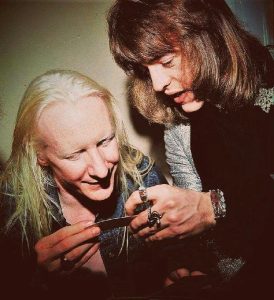 What was so special about playing alongside Johnny Winter?
What was so special about playing alongside Johnny Winter?
Johnny Winter was a very respected blues guitarist and when I played with The McCoys, he really helped me with the audiences. They saw that I was an equal with Johnny Winter. They thought: “If Johnny Winter is considered great, that guy, Rick Derringer, must be pretty good too”.
Did you have trouble editing Edgar Winter’s “Frankenstein” (1972) song?
“Frankenstein” was a really great record to record. I was the producer of it (ed: on Edgar Winter’s “They Only Came Out at Night” album -1972). The record company didn’t have good ideas. They said it wouldn’t fit on that record, but producer Bill Szymczyk (ed: The Eagles) and I, both realized that it was probably the best song of the album. So, we turned out to be very right and it turned out to be #1. Another #1 record.
I love your playing on “Tobacco Road” from Edgar Winter’s White Trash’s “Roadwork” (1972) live album! Are you proud of this version?
I love the “Roadwork” album, in particular. It is one of my favourite albums. That band that we played on the road with: Bobby Ramirez on drums, Randy Jo Hobbs on bass, Jerry LaCroix singing and Jon Smith playing saxophone, it was just a great-great band. To me, it’s one of the best live albums ever recorded.
You opened for Led Zeppelin on Day on the Green in Oakland Ca on 23-24 July 1977. What memories do you have of these concerts?
They were the last two concerts that Led Zeppelin ever played in the United States. After that, when they came back to England, they had health issues, John Bonham died and they pretty much stopped playing concerts for a long time. So, the Day on the Green concerts were the last two concerts that they ever played in the United States and they were really great concerts. There was a huge audience, the stadium was full of people. Some people said that there were maybe 100.000 people and they were great-great shows.
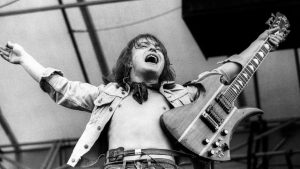 Eddie Van Halen said that you copied his “Eruption” solo when in fact he did copy your “Rock and Roll, Hoochie Koo” solo from “Derringer Live” album (1977) where you are also playing “You Really Got Me (The Kinks). Is it frustrating that many people don’t know that you did it first?
Eddie Van Halen said that you copied his “Eruption” solo when in fact he did copy your “Rock and Roll, Hoochie Koo” solo from “Derringer Live” album (1977) where you are also playing “You Really Got Me (The Kinks). Is it frustrating that many people don’t know that you did it first?
Yeah. I love Eddie Van Halen. My band called Derringer had a player called Danny Johnson. Johnson was the first guy I ever saw doing that tapping the neck technique. Eddie Van Halen said he used to come here and watch Danny Johnson and I, playing in the Derringer band, before they were even successful. So, my idea was that Eddie copied a lot of that tapping technique from Danny Johnson, who was in my band and obviously “You Really Got Me” was one of our encore songs for a long time. So, Eddie may heard us playing that, too.
Van Halen covered “Rock and Roll, Hoochie Koo” before they release their debut album!
Yeah, I played that long guitar solo on “Rock and Roll, Hoochie Koo” for many-many years and Eddie heard me playing many times (laughs). I love Eddie Van Halen.
You jammed a lot of times with Jimi Hendrix at The Scene Club in New York. What memories do you have of Jimi?
My band, The McCoys were called the house band at The Scene, which means that we played there regularly. Because of that, we had the opportunity to jam with many-many great rock ‘n’ roll players there and one of them was Jimi Hendrix. Jimi Hendrix would come down and play often. One night, my guitar was stolen from the dressing room and Jimi said: “Why don’t you just use of couple of my guitars?” He loaned me his guitars, so that I could continue playing for the rest of the night.
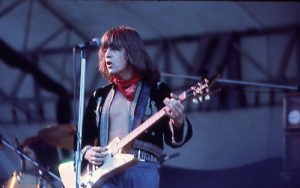 Is it you who plays on the live bootleg (“Bleeding Heart” or “Woke Up This Morning and Found Myself Dead”) with both Jimi Hendrix and Jim Morrison?
Is it you who plays on the live bootleg (“Bleeding Heart” or “Woke Up This Morning and Found Myself Dead”) with both Jimi Hendrix and Jim Morrison?
Yeah, I was there that night and you might hear me playing some music in the background. I was definitely there. I saw bouncers carrying Jim Morrison out of the club very drunk.
You played great slide guitar on “Show Biz Kids” from Steely Dan’s “Countdown to Ecstasy” (1973) album. Was it an interesting experience to do that session?
Yes, I played on the demo record that Donald Fagen (ed: vocals, keyboards) did, that then became Steely Dan. So, I knew them very well and when they asked me to play on “Show Biz Kids”, I was excited and also I love the solo on “Chain Lightning” (ed: from “Katy Lied” -1975). That’s a good one, too.
What was it like to be in the same band with Ringo Starr?
Oh, when I played with Ringo I got to play all over the world. I played three years with Ringo Starr and we played concerts in Europe, all over Russia, we played in South America, the United States, the Orient, Japan, Australia and it was a lot of fun. It gave you the experience of being a Beatle.
 Did you have fun when Paul McCartney joined Ringo for the song “Birthday” at Radio City Music Hall on 7/7/2010?
Did you have fun when Paul McCartney joined Ringo for the song “Birthday” at Radio City Music Hall on 7/7/2010?
Yes, it was a surprise. The band was told about it, because we had a soundcheck and rehearsal with Paul McCartney. We were told: “Don’t tell Ringo, because it’s a big surprise”. Surely, we all took an oath, nobody told Ringo and he was really surprised when Paul came out on stage. So, I got to play on stage “Birthday” with Paul and Ringo.
What is the secret of your lasting friendship and collaboration with Edgar Winter?
Edgar and I, met the night that Johnny Winter first heard The McCoys playing. Edgar was the one who convinced Johnny to use The McCoys as his new band. We were really Johnny Winter and The McCoys, but people didn’t want to use “The McCoys” then, so they just dropped it and called us “Johnny Winter And”. But that was the night I met Edgar Winter, who convinced Johnny that it was a good idea to use The McCoys for his backup band and Edgar and I have been great friends and we have been playing concerts together ever since.
Your cover to Stevie Ray Vaughan’s “Pride and Joy” [from 1993’s “Hats Off To Stevie Ray (L.A. Blues Authority Volume III)”] in amazing. Would you like to tell us a few words about this song?
Once again, I met Stevie Ray Vaughan. I used to go and hear the band Double Trouble. Guitar player, Jimmie Vaughan, Stevie’s brother told me: “Go and hear my brother play some night”. Stevie was only playing in pubs and the first opportunity I had to go see him, I heard him playing and I came back to New York City. There was a famous record executive named Jerry Wexler, who was a good friend of mine too and he was in Atlantic Records. I told Jerry Wexler: “I heard this great guitar player in Texas. I think he ‘d be great for your label” and he told me: “He ‘s white playing the blues, uh?” I said: “Yeah” and he goes: “Well, I don’t know if we can use him now” (laughs). Jerry Wexler missed the opportunity to sign Stevie Ray Vaughan before anyone else discovered him. David Bowie then really helped to make him famous.
 You produced some demos with Savatage, but not an album. What went wrong with Atlantic Records, especially with Jason Flom (then in the A & R department, future chairman)?
You produced some demos with Savatage, but not an album. What went wrong with Atlantic Records, especially with Jason Flom (then in the A & R department, future chairman)?
Yes, Jason Flom asked me to try to produce a couple of songs with Savatage, which I did… but Jason Flom didn’t really like the work that we all did together. He asked somebody else to go and produce Savatage. I don’t remember who did it (ed: Max Norman -Ozzy Osbourne, Megadeth), but I liked Savatage. I thought we did good work together.
Who are your influences as a guitarist?
I like Les Paul, Chet Atkins, Jimi Hendrix, George Benson. I like a lot of those guitar players. Lately, I like Eric Gales… Let’s see who else is really good now? I don’t know. They are too many to start singling them out. I like a lot of the guitar players.
How did you get to meet John Lennon?
John Lennon! I was living in Manhattan and so was he. He was going to do a concert in Detroit for John Sinclair, a famous political activist in those days. He was under arrest, I think, and he had to go to trial. So, John Lennon thought that it would be good to play some kind of benefit concert for John Sinclair in Detroit and I was asked to be part of John’s band on that concert. He ’d use also another guy named David Peel and some members of his band, but when the time for the concert came around, for some reason, I couldn’t go to Detroit, so I didn’t play in the actual concert. But I had the opportunity to visit John and Yoko in their apartment in New York City and play guitar with John. John was a really nice guy. He had a good sense of humour about Yoko and especially about her art. He just turned out to be a very-very nice man. I got along very well with John.
Do you think popular music which was written in the ‘60s and ‘70s is much better than today’s music?
I think all music is good music. Today, we have too much electronic and computer involvement for my taste, but I think when you make too much of computer, then you are taking out a lot of the human qualities. We certainly didn’t have all those computers in the ‘60s and ‘70s. So, in a lot of ways, the music then was more real, more human.
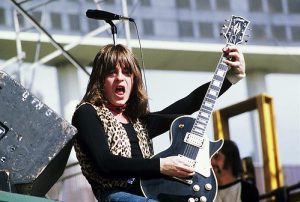 Do you have any regrets in your life?
Do you have any regrets in your life?
Oh, I probably would not have taken all these many drugs, as we took in the ‘60s and ‘70s, but other than that, I ‘ve been blessed by God and ‘ve given this talent that not many people get and I always thank God for that talent. So, I have no regrets. I thank the Lord.
Did you like Alvin Lee (Ten Years After) as a guitarist?
Yeah!!! Boy, at the time, for a while, he was like the #1 guy! I think he was good at playing very fast. Alvin Lee was a really good guitarist.
A huge “THANK YOU” to Mr. Rick Derringer for his time.
Rick Derringer Official website: https://www.rickderringer.com/
Rick Derringer official Facebook page: https://www.facebook.com/rickderringerofficial/

